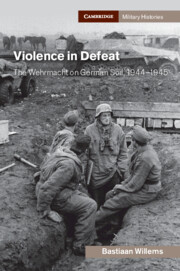Book contents
- Violence in Defeat
- Cambridge Military Histories
- Violence in Defeat
- Copyright page
- Contents
- Figures
- Maps
- Tables
- Acknowledgements
- Chronology of Events
- Abbreviations
- Introduction
- 1 Regionality and Total War in East Prussia
- 2 Eastern Front Battles on German Soil
- 3 The City As a Fortress Community
- 4 Redefining Königsberg: Historical Continuity in Practice
- 5 The Evacuation of East Prussia
- 6 Königsberg as a Community of Violence
- Conclusion
- Appendices
- Bibliography
- Index
Conclusion
Published online by Cambridge University Press: 12 February 2021
- Violence in Defeat
- Cambridge Military Histories
- Violence in Defeat
- Copyright page
- Contents
- Figures
- Maps
- Tables
- Acknowledgements
- Chronology of Events
- Abbreviations
- Introduction
- 1 Regionality and Total War in East Prussia
- 2 Eastern Front Battles on German Soil
- 3 The City As a Fortress Community
- 4 Redefining Königsberg: Historical Continuity in Practice
- 5 The Evacuation of East Prussia
- 6 Königsberg as a Community of Violence
- Conclusion
- Appendices
- Bibliography
- Index
Summary
The year 1945 will ultimately be considered as one of the most violent in German history. For the East Prussian capital of Königsberg it was its final year, since on 4 July 1946 the city was rechristened Kaliningrad after the recently deceased Soviet President Mikhail Kalinin, who, as the political scientist Richard Krickus somewhat sarcastically noted, ‘never visited the place’.1 Königsberg was in a death struggle for its status as a German city, a battle it would ultimately lose. Four years later, all German citizens had been expelled and in the years that followed the new Russian authorities sought to erase all signs of what they considered to be ‘Prussian militarism’, culminating in the destruction of the ruins of the Königsberger Schloss in 1968.2 During the siege, few people envisioned themselves as part of a German future for Königsberg. This study highlights that the concerns of the principal actors did not centre on their role in the Third Reich; rather, it reveals how strongly people clung to their immediate local environment and how this impacted behavioural patterns.
- Type
- Chapter
- Information
- Violence in DefeatThe Wehrmacht on German Soil, 1944–1945, pp. 286 - 300Publisher: Cambridge University PressPrint publication year: 2021



